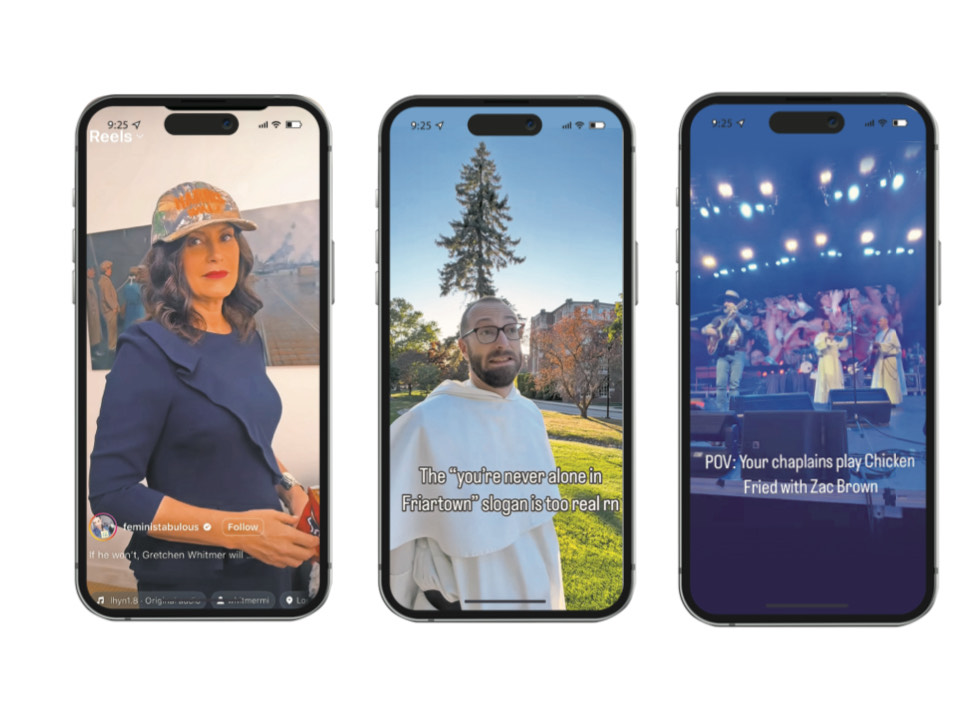
In a recent social media video labeled “POV [point of view]: When a student forgets their phone at the chapel,” Fathers Simon Teller and Damian Day from Providence College “find” a student’s
cell phone and proceed to use it to take light-hearted selfies around the university’s chapel.
At one moment in the video, captioned “chaplain shenanigans,” Father Day sits behind the chapel’s organ. In another moment, Father Teller stands with the altar bells on his head. And in another, he poses for a photo on the altar with a Bible and Communion chalice in hand.
The video, posted Sept. 19 to Instagram and set to upbeat music, has been viewed more than 7.5 million times and amassed more than 534,000 likes as of Oct. 28. The second part of its caption is an invitation for students to volunteer at the chapel.
“And if any students are interested in getting involved in volunteering at the chapel as sacristans, servers, lectors, or ushers, either [direct message] us or email Father Damian Day,” the second part of the caption reads.
At a time when the convergence of faith and social media is in the news after Michigan Gov. Gretchen Whitmer mocked the sacrament of Communion in an Instagram video, Father Teller said faith-based social media content, including that which is light-hearted, is possible if it’s done in a way that the creator believes “brings people closer to Jesus.”
Whitmer’s video, posted on Oct. 10, depicts her feeding a Dorito to an influencer who is on her knees — something many criticized as mocking a pastor placing the Eucharist on the tongue of a parishioner.
“It is not just distasteful or ‘strange;’ it is an all-too-familiar example of an elected official mocking religious persons and their practices,” Paul Long, the Michigan Catholic Conference (MCC) president and CEO, said in an Oct. 11 statement. “While dialogue on this issue with the governor’s office is appreciated, whether or not insulting Catholics and the Eucharist was the intent, it had an offensive impact.”
In response to the criticism, Whitmer stated she “would never do anything to denigrate someone’s faith.” She said her team had spoken to the MCC and claimed that the video’s depiction was misconstrued.
Father Teller said he didn’t see the Whitmer video and, therefore, declined to comment on it. He did, however, acknowledge that for anyone making content related to the faith, there needs to be a discernment process to decide whether or not the video is beneficial or scandalous.
“The most important criterion is to sit down and think about if this is actually doing anything to bring people closer to Jesus. We always have to make sure that there’s an element of making sure that people see the Lord in the video,” Father Teller told The Tablet, noting he and Day try to avoid negative trends and thinking just in terms of getting views.
Father Teller, a chaplain and director of campus ministry at Providence College in Rhode Island, has amassed more than 65,000 Instagram followers since his first post last November. He said he hadn’t used social media before arriving at the college in 2021 when he realized the impact it could have on getting information to students and humanizing himself and the faith on campus.
Since his first video, many of Father Teller’s videos have garnered millions of views. Some of the most viewed videos simply show the behind-the-scenes sights and sounds of setting up for Mass. Others, like
the chapel selfies video, are more comedic.
One video shows Father Teller trying to follow along with four students as they dance to a popular pop song. It’s labeled, “POV: Trying to teach the Friars how to TikTok.” Another depicts Teller and two other priests emerging from the college’s swimming pool to superhero music with the label, “When a student asks a Friar to hear their confession.”
All of the videos include an informative caption for students. For instance, a video of Father Teller and two other priests walking through different parts of campus set to Matthew Wilder’s “Break My Stride” invited the class of 2028 to a Mass of Welcome. “We’ve seen huge effects of [social media],” Father Teller said, adding that the content reaches both Catholics and non-Catholics.
“[As a priest] here’s sort of a barrier in getting students to even feel comfortable talking to you, and I’ve found that social media helped bridge that gap,” he said. “I’ve found that being on social media has increased the number of interactions that I have in real life with students, which is ultimately the most important thing.”
While Father Teller is speaking from the perspective of a priest, he said the key for anyone making faith-based social media content is being true to yourself as a Catholic first and foremost. He said that everything else would fall into place with that in mind.
“The more true you are to your mission of preaching, the more of a pull you’ll actually have on people,” he explained. “We’re not just hoping to get views. We’re hoping to get souls for Jesus.”
